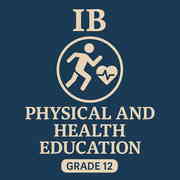Professional Courses
Industry-relevant training in Business, Technology, and Design
Categories
Interactive Games
Fun games to boost memory, math, typing, and English skills
Typing
Memory
Math
English Adventures
Knowledge

IB 12 Physical and Health Education (SEHS)
The integration of sport and health is increasingly recognized in contemporary society, highlighting the impact of physical activity on preventing lifestyle diseases, addressing gender equity in sport, and the implications of technology and doping. Understanding these issues empowers individuals to engage ethically and critically with physical fitness.
8 Chapters
60 hr
We're sorry, but this course is currently unavailable. It may have expired, be pending
approval, or still be processing
your enrollment. Please check back later or contact your instructor or support for
assistance.
Course Chapters
Chapter 1
Chapter 1: Anatomy and Physiology
Chapter 2
Chapter 2: Exercise Physiology
Chapter 3
Chapter 3: Energy Systems
Chapter 4
Chapter 4: Movement Analysis
Chapter 5
Chapter 5: Skill Acquisition and Psychology
Chapter 6
Chapter 6: Measurement and Evaluation of Human Performance
Chapter 7
Chapter 7: Nutrition and Health
Chapter 8
